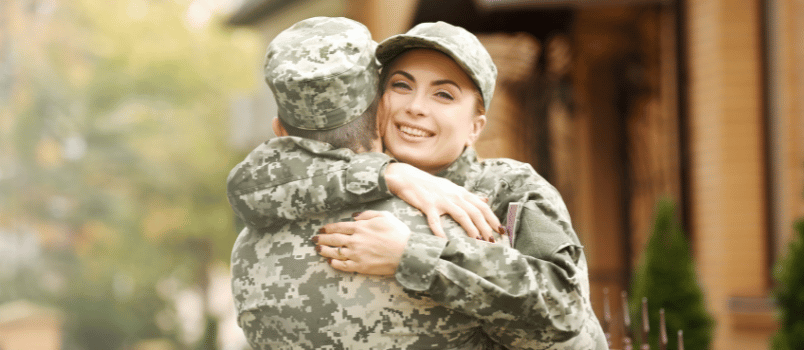|
IN THIS ARTICLE:
Military deployment refers to when military couples are separated due to the military service member deploying to aa combat or non-combat zone. Military deployments last anywhere from a few months to over a year and can take a big toll on military relationships. While military service, including deployments, can be a source of patriotic pride, it can be incredibly stressful for civilian military spouses who are at home waiting for their spouse to return. It can can also have an impact on their mental health and cause more depression symptoms. This article will ex[lore some of the challenges faced by military spouses during military related deployments, as well as some coping skills for military spouse deployment depression.
Understanding military spouse deployment depression
Military spouse deployment depression refers to the mental health struggles military spouses often face while their partner is gone on a military deployment. Your spouse is your primary support system, and when you can't communicate with your spouse due to deployment, it can cause a lot of distress. When a spouse is deployed, it can cause sadness, loneliness, and anxiety as well as sleeping challenges, and difficulty with concentration and making decisions. It can also cause symptoms of depression such as tearfulness, loss of interest in activities you used to enjoy, feeling fired all the time, feelings of worthlessness, and even thoughts of suicide.
While deployment is often a sad and lonely experience for all military spouses, the cause of developing depression has any factors. Military spouses who already struggle with anxiety and depression may find that their symptoms are worsening while their spouse is deployed. Additionally, military spouses with young children who are now entirely responsible for the management of the home can find military deployments particularly difficult and stressful. The nature of your spouses deployment may also be a factor. If your spouse is deployed to a combat zone, you ay be feeling a lot of fear for their safety and this could be related to secondary traumatization. Lastly, the lack of communication and inability to get support from your partner due to the military deployment, can have a big toll on how you feel emotionally. Challenges faced by military spouses during deployment
There is a wide range of challenges that military spouses might face during deployment. These might include financial challenges, emotional challenges, and social challenges.
FINANCIAL CHALLENGES If your partner is the primary breadwinner, then you may feel like there is a decrease in income while your partner is gone. While there is often additional deployment pay, if you don't have access to your partners bank account or the bills are on autopay, it can be finically stressful. Generally, it is helpful to expect that things will go wrong when your partner is deployed, and having access to the money in the event of emergency can really help. EMOTONAL CHALLENGES It can be overwhelming to have all of the tasks that normally were spread out across two adults, all the sudden be your entire responsibility. You'll likely feel tired just from having so much more to do. It's also common to have some anxiety about the future, the safety of your partner, and anxiety about the health of your relationship. SOCIAL CHALLENGES While many people try to be helpful and supportive, it can be hard when they don't get your experience. If you are living far away from your family and friends, the lack of familiar people and not having your typical support system near by can be challenging. You may also worry about being judged at work or in communities that don't understand what it is like to go through military spouse deployment depression. Coping with military spouse deployment depression
Coping with deployment depression is essential for our own sanity, mental health, and wellbeing, as well as for the strength of your marital relationship. Some of the most important coping skills or deployment depression include developing a support system, communication, self-care and scheduling fun events, counseling, and relational coping.
DEVELOP A SUPPORT SYSTEM It's essential to have a support system in place while our partner is deployed. This can be in the form of friends and family, but there are often times military spouse support groups that you can join. It can be help to hang out with other military spouses who are going through the same thing. COMMUNICATION When your spouse is deployed, communication s decreased and every letter or phone call is cherished. It is important that when you do finally get to talk with your partner, the two of you are able to communicate in effective ways and be a support system for each other. This can help with the loneliness and help you feel reconnected to your spouse. If you are concerned about how your communication will go while your partner is deployed, consider working with a marriage counselor who can help you learn effective communication skills in the months leading up to the deployment. SELF-CARE When you are experiencing military spouse deployment depression, it's easy to stay inn pjs all day and binge watch Netflix. While this is fine some of the time, getting into a self-care routine will also help you cope with the deployment depression. This routine should include exercise, eating healthy, hobbies, and spending time with friends. It can be helpful, as part of your self-care, to plan fund trips. These trips could be to trips to see friends and family or smaller trips like going to the beach or to a concert. Having pleasant activities to look forward o can help boost your mood and also help the time pass ore quickly. COUNSELING Individual or group counseling can be helpful while you are dealing with military spouse deployment depression. Individual counseling can provide a confidential and nonjudgmental space to get individualized support. A therapist can help you learn new coping skills to help you navigate the deployment depression. Group counseling can be helpful as well. Group counseling is different than a support group in that it is usually limited to 8-10 people and is facilitated by a trained therapist. These counseling groups can be helpful to get support from other who are going through the same thing while also having the support of a professional counselor in the meetings. RELATIONAL COPING As a marriage counselor, I put a lot of importance on relational coping. This is idea that comes from Emotionally Focused Couples Therapy and attachment theory. Since your partner is your biggest support system, it is helpful to continue to utilize them in your coping with deployment depression. Way you can do this include imaging what you would tell them if they were home and how they would respond to you; it might also include having voce or video memos that you have pre-recorded for each other to remind you how much you are loved. Another great option is to have a shirt or stuffed animal that they gave you and spray it with your partner's cologne or perfume--you can hold it and remember how your partner smells when needing to feel more connected to them. Resources for military spouses
There are several resources are available to support military spouses during deployment. You could check out the Military Spouse Advocacy Network, the National Military Family Association, and Military OneSource for a variety of support services including free non-medical counseling. For working on your couples communication, check out The Communicate & Connect Podcast for Military Relationships.
Military spouse deployment depression is a real thing and it impact so many military spouses! The challenges faced during deployment, and the separation from your partner, can have a big impact on your emotional and mental wellbeing. Getting support from friends, family, other military spouses, and professional can go a long way in helping your cope with deployment depression. You definitely aren't alone, and you don't have to go through military spouse deployment depression alone either. Looking to improve your communication before deployment?
Elizabeth Polinsky Counseling provides online Emotionally Focused Couples Counseling, as well as weekend-long Marriage Intensives, throughout the states of Virginia, South Carolina, Arkansas, and Nevada. Click the button below to schedule a complimentary consult.
About the Author
DISCLAIMER:
My podcast, blogs, videos, newsletters, and products are general information for educational purposes only; they are not psychotherapy and not a replacement for therapy. The information provided is not intended to be therapy or psychological advice; and nothing I post should be considered professional advice. The information provided does not constitute the formation of a therapist-patient relationship. I cannot answer questions regarding your specific situation; you should consult your doctor or mental health provider regarding advice and support for your health and well being. If you are experiencing a medical or mental health emergency, you should call 911, report to your local ER, or call the National Crisis Hotline at 1-800-273-8255. The podcast, blogs, videos, newsletters, and products are not a request for a testimonial, rating, or endorsement from clients regarding counseling. If you are a current or former client/ patient, please remember that your comments may jeopardize your confidentiality. I will not “friend” or “follow” current or past clients to honor ethical boundaries and privacy; nor will I respond to comments or messages through social media or other platforms from current or past clients. Current and past client’s should only contact me through the professional contact information provided on the website. Lastly, accounts may be managed by multiple people. Therefore, comments and messages are monitored by staff and are not confidential.
0 Comments
Your comment will be posted after it is approved.
Leave a Reply. |
AuthorElizabeth Polinsky Counseling provides marriage counseling, weekend-long marriage intensives, and therapist training in Emotionally Focused Couple Therapy (EFT). Online couples counseling services are available in Virginia Beach Virginia, and throughout the states of Virginia, South Carolina, Arkansas, and Nevada. Archives
November 2022
Categories |
Address283 Constitution Drive
One Columbus Center Ste. 600 Virginia Beach, VA 23462 |
Telephone(757) 262-3316
Fax
(757) 260-9965
|
info@elizabethpolinskycounseling.com
|
|




 RSS Feed
RSS Feed